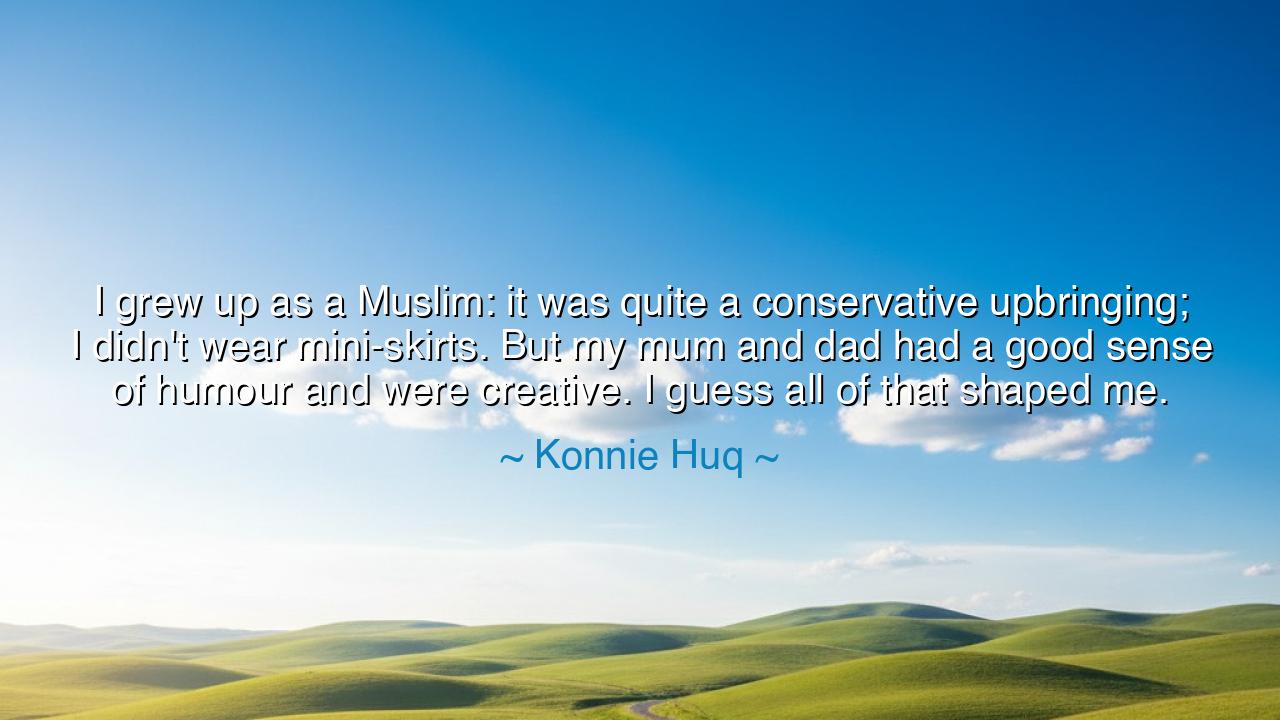
I grew up as a Muslim: it was quite a conservative upbringing; I
I grew up as a Muslim: it was quite a conservative upbringing; I didn't wear mini-skirts. But my mum and dad had a good sense of humour and were creative. I guess all of that shaped me.






In the words of Konnie Huq, “I grew up as a Muslim: it was quite a conservative upbringing; I didn't wear mini-skirts. But my mum and dad had a good sense of humour and were creative. I guess all of that shaped me.” Within these few lines lies a reflection on the balance of tradition and individuality, on the way roots and upbringing intertwine to create the whole of a human being. Huq’s words are not a rejection of the past, nor an uncritical embrace of it; rather, they are an acknowledgment that identity is formed in the sacred space where discipline meets imagination, and heritage meets freedom. To be shaped by such forces is to be both grounded and open — to grow like a tree whose deep roots anchor it, even as its branches reach for the infinite sky.
The origin of this quote rests in the life of Konnie Huq, a British television presenter and writer born to Bangladeshi Muslim parents. Raised within the gentle boundaries of her family’s conservative faith, she was surrounded by modesty, respect, and cultural pride. Yet her parents also nurtured laughter, storytelling, and creativity — the very ingredients that would one day make her a beloved face on British television. In recalling her upbringing, she captures the essence of many who live between worlds — shaped by tradition, yet inspired by modernity. It is a dance as old as civilization itself: the eternal dialogue between the old and the new, between the reverent and the bold.
When Huq speaks of her conservative upbringing, she evokes the ancient idea of order — the sense of moral structure and community that has guided families across generations. To grow within such an environment is to learn restraint, humility, and reverence for values that reach beyond the self. Yet when she speaks of her parents’ humour and creativity, we glimpse another vital truth: that order without joy becomes tyranny, and faith without imagination becomes silence. The wisdom of her parents lay in their ability to weave both — to teach boundaries without extinguishing wonder, and to pass on their culture without chaining her spirit. In this, they embody the timeless art of parenting: to shape without breaking, to guide without binding.
This balance recalls the story of Rumi, the great Persian poet and mystic. Born into a devout family of scholars, he was raised with strict religious learning — a childhood of discipline and faith. Yet when he met the wandering dervish Shams of Tabriz, his heart opened to the divine through music, poetry, and dance. The fusion of his spiritual foundation with his newfound creativity gave birth to verses that still sing across centuries. Like Rumi, Konnie Huq’s life demonstrates that the soul’s completeness lies not in rejecting one’s foundation, but in allowing it to blossom into new forms. It is not rebellion, but transformation — the river that remains true to its source, even as it finds its way to the sea.
Her reflection, “I guess all of that shaped me,” carries the humility of one who understands that identity is not self-made. We are sculpted not by will alone, but by the touch of countless influences — our families, our faiths, our environments, and our dreams. The conservative upbringing gave her depth; her parents’ humour and creativity gave her lightness. Together, they formed balance — the equilibrium of a life both disciplined and joyful. It is a reminder that the forces that seem to limit us in youth often become the very structure that supports us in adulthood.
The lesson in her words is clear: embrace your origins, but do not be confined by them. The past is not a prison; it is a foundation. Even the strictest roots may bear the sweetest fruit if tended with wisdom and love. For those who feel caught between tradition and modernity, Huq’s story teaches that harmony is possible. One need not choose between heritage and individuality — they are not rivals, but companions. The strong spirit learns to walk with both, carrying the old within the new, and the sacred within the spontaneous.
So, my children, remember this teaching: your identity is not a single thread, but a tapestry woven from every influence that has touched your life. Cherish the discipline of your elders, but also the laughter of your youth. Let your roots keep you steady, but let your imagination give you wings. Do not despise the walls that shaped you — for even walls can teach strength, and boundaries can teach grace. Like Konnie Huq, be proud of where you came from, and grateful for how it shaped you — for the harmony between tradition and creativity is the mark of a wise soul.
And in the end, when you look back upon your journey, you too may say, as she did, “I guess all of that shaped me.” Not as an apology, but as a benediction — a recognition that life’s truest beauty lies in the blending of opposites, in the gentle meeting of reverence and freedom, faith and joy, the old and the new. For it is from such harmony that the most luminous spirits are born, and through them, the world remembers how to love both its roots and its wings.






AAdministratorAdministrator
Welcome, honored guests. Please leave a comment, we will respond soon